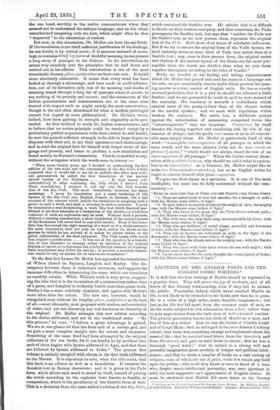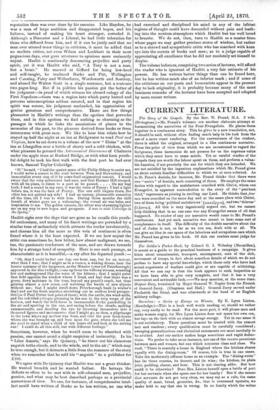LECTURES ON THE ENGLISH POETS AND THE ENGLISH COMIC WRITERS.*
IT 18 well that the best writings of Hazlitt should be reprinted in a popular form. They will prove the joy of students, and of all lovers of fine literary workmanship, even if they fail to attract the public. Popularity, indeed, which never reached liazlitt in life, is not likely to be extended to his books now that he is gone. He is a critic of a high order, acute, forcible, imaginative ; but just as his life was led apart from the common ways of men, so are his works adapted to win admiration from a few, rather than to gain appreciation from the bulk even of well-educated readers. The present generation knows but little of liaxlitt as a man, and less of him as a writer. That lie was the friend of Charles Lamb and of Leigh Hunt ; that he belonged to the once famous Cockney school ; that there was something strange and unpleasant about his married life ; that he received hard blows from the Quarterly and from Blackwood, and gave as hard blows in return ; that he was a thorough "good hater ;" that he united to a strong will and powerful imagination great acerbity of temper and political intol- erance; and that he wrote a number of books on a vast variety of subjects, some of which are out of print, while few retain any hold upon the public,—this is all they know or care to know of a man who, despite much intellectual perversity, was once (perhaps is still) the most suggestive and appreciative of English critics. It must be confessed that liazlitt did more harm to his literary • Lectures on the Engiish POtiA and the English Comic Writers. By Willism Ilazlitt. A New Edition. Edited by William Carew Ilazlitt. London: Bell and D.ildy. 1855.
reputation than was ever done by his enemies. Like Haydon, he was a man of large ambition and disappointed hopes, and his failures, instead of making his heart stronger, corroded it. Although a Dissenter and a Liberal, he had little toleration for those who differed from him, and if it can be justly said that no man ever uttered truer things in criticism, it must be added that no modern critics, not even Wilson and Lockhart in their most pugnacious days, ever gave utterance to opinions more eminently unjust. Hazlitt is continually denouncing prejudice and party spirit, yet it was Hazlitt who said, "A Tory is not a man, but a beast." He sneered at Gifford for being low-bred and self-taught, he traduced Burke and Pitt, Wellington and Canning, Paley and Wilberforce, Wordsworth and Southey, and abused Sir Walter Scott in a single sentence, but a sentence two pages long. But if in politics his passion got the better of his judgment—in proof of which witness his absurd eulogy of the First Napoleon—there was a region into which party hatred and perverse misconceptions seldom entered, and in that region his spirit was serene, his judgment unclouded, his appreciation of genius generous and comprehensive. There are few things pleasanter in Hazlitt's writings than the egotism that pervades them, and in this egotism we find nothing so charming as the passages in which he links the associations of places to the memories of the past, to the pleasure derived from books or from intercourse with great men. We like to hear him relate how he
stayed up half the night at an inn at Bridgwater to read Paul and Virginia, how he sat down to a volume of the new " Eloise " at the inn at Llangollen over a bottle of sherry and a cold chicken, with what pleasure he perused the Astronomical Discourses of Chalmers under the apple trees at Burford Bridge, or with what keen youth- ful delight he took his first walk with the first poet he had ever known, Samuel Taylor Coleridge.
"If," he said, "I had the quaint muse of Sir Philip Sidney to assist me, I would write a sonnet to the road between Worn and Shrewsbury, and immortalize every step of it by some fond enigmatical conceit. I would swear that the very milestones had ears, and that Harmer Hill stooped,
-with all its pines, to listen to a poet as he passed On my way back, I had a sound in my ears, it was the voice of Fancy; I had a light before me, it was the face of Poetry. The one still lingers there, the other has not quitted my side ! I had an uneasy, pleasurable sensation all the time, till I was to visit him. During those months the chill breath of winter gave me a 'welcoming; the vernal air was balm and inspiration to me. The golden sunsets, the silver star of evening lighted me on my way to new hopes and prospects. I was to visit Coleridge in the Spring."
Hazlitt sighs over the days that are gone as he recalls this youth- ful enthusiasm, and many of his finest writings are pervaded by a similar tone of melancholy which attracts the reader involuntarily, and charms him all the snore as this vein of sentiment is often found where it is the least expected. If we see how unjust the critic can sometimes be, how bitter, how almost malignant, we see, too, the passionate tenderness of the man, and are drawn towards him by a strange bond of sympathy. Here is one such passage, as characteristic as it is beautiful,—a cry after his departed youth :—
" Oh, that I could be but one day, one hour, nay, but for an instant, what then I was; that I might as in a trance, a waking dream, hear the hoarse murmur of the bargemen, as the Minster tower (of Peterborough) appeared in the dim twilight, come up from the willowy stream, sounding low and underground like the voice of the bittern ; that I might paint that field opposite the window where I lived, and feel that there was a green, dewy moisture in the tone, beyond my pencil's reach, but thus gaining almost a new sense, and watching the bustle of new objects without me ; that I might stroll down Peterborough bank (a winter's day) and see the fresh marshes stretching out in endless level perspec- tive (as if Paul Potter had painted them), with the cattle, the wind-mills, and the red-tiled cottages gleaming in the sun to the very verge of the horizon, and watch the field-fares in innumerable flocks gambolling in the air and sporting in the sun, and racing before the clouds, making summersaults, and dazzling the eye by throwing themselves into a thousand figures and movements; that I might g; as then, a pilgrimage to the town where my mother was born, and visit the poor farm-house where she was brought up, and lean upon the gate, where she told me she used to stand when a child of ten years old and look at the setting sun! I could do all this still, but with different feelings."
Sometimes, however, when he would seem to be absorbed with passion, one cannot avoid a slight suspicion of insincerity. In his " Liber Amoris," says De Quincey, "he threw out his clamorous anguish tothe clouds, and to the winds, and to the air ;" which may be true enough, but it detracts a little from the romance of the story when we remember that he sold his " anguish " to a publisher for /100.
We agree with De Quincey that Hazlitt was not a great thinker. He wanted breadth and be wanted ballast. He betrays the defects so often to be met with in self-educated men, prejudice, passion, and what may be best described perhaps as a provincial narrowness of view. No one, for instance, of comprehensive intel- lect could have written of Burke as he has written, no one who had exercised and disciplined his mind in any of the loftiest regions of thought could have descended without pain and loath- ing into the noxious atmosphere which Hazlitt but too well loved to breathe. We do not, then, turn to Hazlitt as a master from whose pages we may gather precious stores of wisdom, but rather as to a shrewd and sympathetic critic who has searched with keen eye into the secrets of books and men; as to a judge capable of appreciating all excellence that he did not resolutely set himself to despise.
The volume before us, comprising two series of lectures, will afford the reader who is ignorant of Hazlitt a very fair estimate of his powers. He has written better things than can be found here, but he has written much also of an inferior mark ; and if some of the criticisms on our poets and humourists appear in the present day to lack originality, it is probably because many of the most luminous remarks of the lecturer have been accepted and adopted by more recent writers.































 Previous page
Previous page